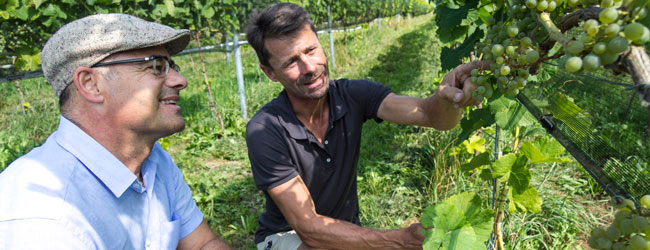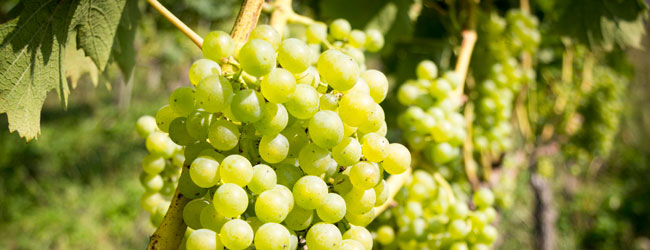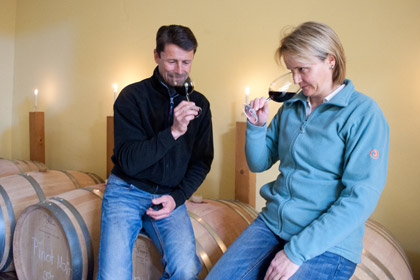We are sorry, this page has not been translated yet.
Weingut Lenz

David Rodriguez of Delinat (left) and wine producer Roland Lenz enjoy the sight of PIWI grapes of the Solaris variety maturing entirely healthily without any pesticides.
The wine-producing couple Roland and Karin Lenz run the biggest organic vineyard in German-speaking Switzerland. On 15 hectares, the vines grow on favourable south-facing slopes with sandy, loamy soils. In addition to the varieties that are typical of Eastern Switzerland, Blauburgunder (red) and Müller-Thurgau (white), the plots are planted with over 20 other varieties, including many fungus-resistant varieties (PIWI vines). “We have had very good results from these varieties, which need only minimal crop protection. Our wines, which use PIWI varieties such as Léon Millot, Solaris or Cabernet Blanc, are received with enthusiasm,” says Roland Lenz.
A difficult start

Present on every vineyard in Eastern Switzerland: Grapes of the Müller-Thurgau variety.
Hektar Rebland, the son of a joiner from Uesslingen, found starting on eight hectares of vineyard at the start of 1994 anything but easy. “Wine from Eastern Switzerland did not enjoy a good reputation. The market was more than saturated. The consumers were very predjudices,” says Roland Lenz, looking back. It was quite clear to him from the outset that he intended to go for quality. Organic wine production seemed to him to offer the best opportunity. But the setback came in 1999: “It was such a bad year in terms of the weather that we would not have survived financially if we had not sprayed conventionally.”
Wine producers on two continents
The shock was so great that Roland and Karin Lenz opened a second vineyard in Chile that same year. It is a country that they had come to know and love when on holiday before their active winter period. Organic wine production is not a problem here from a climatic perspective. This second foothold, which is managed by their partner Ruedi Rüesch, gave them the courage to try again in Switzerland. In 2006, the most difficult plot was switched back to organic to see if it would work. It did. Gradually, all the other plots were also switched to organic with the result that the entire Lenz vineyard has been certified organic since 2010. Roland Lenz: Similar to 1999, the years “2010 and 2012 were difficult in Eastern Switzerland, but thanks to our additional know-how and greater experience, we have never gotten into serious difficulty again.”

Following their setback, Roland and Karin wholeheartedly returned to organic wine production.
Producing around 120,000 bottles a year, the Lenz vineyard is one of Switzerland’s bigger in-house wine producers. Easily half of the bottles go straight from the vineyard to private individuals with the remainder going to restaurants and the wine trade. Various Lenz wines were given medals at the organic trade fair in Nuremberg in 2012. Since then, organic wines from Eastern Switzerland have also become more popular in Germany.




